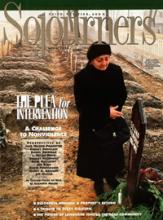Like the clever and witty character developments in her detective fiction, Dorothy L. Sayers's life unfolds only with careful sleuthing. Nothing integral to the plot is uncovered easily. Sayers's fiction, theology, and daily life left little room for the mundane and meandering.
Born in 1893 at Oxford to a clergy family, Dorothy L. Sayers lived through the mad destruction of two world wars. A contemporary of C.S. Lewis and Charles Williams, she was one of the first women to receive a degree from Oxford University, and this she achieved with scholastic honors. Later, disproving criticisms that the detective writer was no longer an academic, she translated Dante's Divine Comedy into accessible and entertaining English.
Obviously, the woman initially famous for creating Lord Peter Wimsey and Harriet Vane still holds the curiosity of many. To commemorate the centennial year of her birth, two new biographies have been written. Alzina Stone Dale titles her biography Maker & Craftsman: The Story of Dorothy L. Sayers and David Coomes calls his Dorothy L. Sayers: A Careless Rage for Life. As the titles suggest, these biographers differ in how they approach the significant influences and features of D.L. Sayers' life.
Compensating for previous attention given Sayers's fictional writings and her preponderance for good food, intellectual conversation, and eccentricity, her Christian beliefs predominate in the books. Both Coomes and Dale discuss how these beliefs influenced all her writings and how they affected her daily life.
Dale adapts her title from a verse found in a memorial to Sayers: "Praise him that he hath made man in his own image, a maker and craftsman like himself." It is the verse that Sayers used as the crux in her drama "The Zeal of Thy House." Dale feels that it is within this play that her religious and creative aesthetic begins to work itself out.
Read the Full Article

